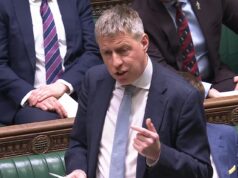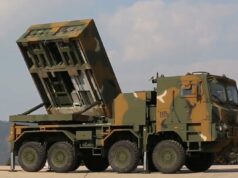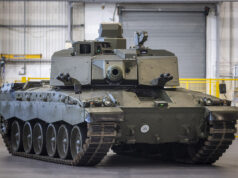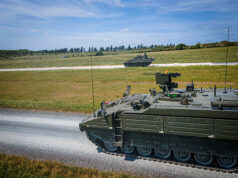The Ministry of Defence (MOD) has disclosed the proportion of defence equipment procured domestically versus abroad.
In a written response to Rupert Lowe, Reform UK MP for Great Yarmouth, Minister of State for Defence Maria Eagle provided a breakdown of spending:
“For the Financial Year 2023-24, the Ministry of Defence’s (MOD) total global expenditure with industry and commerce, including Foreign Military Sales and direct payments to Foreign Governments, was £34.6 billion of which £5.5 billion (16%) related to work that took place outside of the UK.”
This means that 84% of the MOD’s expenditure during the financial year supported work carried out within the UK, demonstrating the government’s reliance on domestic manufacturing to meet defence requirements.
Statistics on MOD expenditure with industry, including regional breakdowns and supplier details, are published annually and can be accessed via the government website.
This comes not long after we reported a 24% increase in spending on Chinese-manufactured goods over the past five years, highlighting a growing reliance on Chinese products within the UK’s defence supply chain.
The total expenditure from 2019-2024 amounts to £17.5 million. The MOD’s direct spend on Chinese-manufactured items was detailed as follows:
- 2023-24: £4.6 million
- 2022-23: £3.6 million
- 2021-22: £3 million
- 2020-21: £2.6 million
- 2019-20: £3.7 million
The figures represent spending rounded to the nearest £100,000.
Maria Eagle, Minister of State for Defence, highlighted that while the MOD welcomes foreign trade, it ensures purchases meet strict regulatory requirements.
“The Ministry of Defence welcomes foreign trade where it allows us to provide our Armed Forces with the equipment they require, meets our stringent legal and regulatory requirements, and does not compromise our national security,” Eagle stated.
She was clear that all transactions undergo scrutiny for potential national security concerns, with mitigations applied where necessary.
The increasing expenditure on Chinese goods comes amid heightened global awareness of the risks posed by supply chain dependencies on potential strategic competitors. Analysts suggest that the trend reflects a lack of alternative suppliers for certain critical items, exacerbated by global manufacturing shifts towards Asia.
Eagle underscored the MOD’s vigilance in addressing such risks.
“Transactions continue to be monitored where there are potential national security concerns from any country, and the Department will investigate and apply appropriate mitigations where required,” she stated.
The reliance on Chinese goods within defence supply chains has come under increasing scrutiny in recent years, as nations reassess the security implications of such dependencies. The MOD’s disclosure reflects a balance between operational needs and the need to address national security concerns.
We previously reported that a recent Freedom of Information (FOI) request published on the Government website revealed that UK government departments have procured uniforms, protective gear, and other essential items from Chinese suppliers.
The FOI response details a range of clothing and equipment purchases from Chinese firms for several government departments, including the Ministry of Defence (MOD) and the Home Office.
The items sourced include uniforms, outerwear, and protective equipment used by personnel in various capacities across government services. The purchases reflect a broader trend of sourcing affordable and durable materials that meet the specifications required for government-issue attire and accessories.
The uniforms obtained from Chinese suppliers cover standard operational wear, including shirts, trousers, jackets, and outerwear designed for challenging conditions. Alongside these uniforms, other practical items like high-visibility jackets and fire-resistant clothing are part of the procurement list. Accessories such as hats, gloves, and belts, essential for full uniform kits, have also been sourced from China, demonstrating the extensive range of items involved.
An MoD spokesperson said previously:
“As part of an international supply chain, around 16,000 different items of military clothing are sourced for our Armed Forces. Our contractor must abide by strict procurement regulations to ensure that any risks around modern slavery are identified and addressed during the tender process and the subsequent contract.”
When talking to a source, I was also told that all purchases adhere strictly to procurement policies and are evaluated to ensure they meet the standards required for durability and safety, there’s no question on the quality. However, with China as one of the primary suppliers, questions can be asked about the implications of sourcing critical goods from a nation with which the UK has a complex and sometimes tense trade relationship.














Putting aside the procurement of Chinese goods 84% is a decent amount and it would be foolish to think we could get to 100% as there some kit that just makes sense to buy from allies.
Chinese expenditure in defence is a concern but I would say it is in many other parts of the economy, for instance no good having a UK defence suppliers factory running off energy from wind turbines bought from China, if war broke out the entire spares supply chain for the turbine would halt, trubines would break and shortly after it the factory that produces defence equipment would stop producing. We need to look at the entire economy not just defence.
I agree.
If you go above this then you end up not buying sensible COTS/MOTS solutions. Cost then balloon and you just end up with less kit.
I really do think that MOD needs to step away from another tranche of Les Grande Projects when the 2.5% comes through and focus the resources on getting the numerous quick and small projects, that make a lot of difference to the front line moving sharpish. This way the boys and girls at the sharp end see jam today and not endless jam in some other eternity.
Oh, and a nice pay rise for the very useful RFA would get more ships at sea and the RFA can and should be doing disaster relief so increasing the capability of our few escorts to do some escorting.
Hi SB, Sadly I don’t think the rise to 2.5% will have a huge effect, even if it is sooner rather than later. The Pay Award every year comes from the MoD budget; there is never any additional in-year money for that from HMT. The cost of the SSBN programme is very high. F-35s continue to be very expensive and we need to order at least one more tranche. Money needs to be found to improve accomodation (barracks and quarters) and recruiting/retention. Far too much is being spent on consultants, middlemen and PFI programmes. The army needs more money to complete the very expensive Boxer programme as only 623 have been ordered (half of the requirement)… and also money might have to be set aside for some sort of IFV programme. US-sourced equipment seems to get more expensive as the exchange rate fluctuates often in favour of the US. Money needs to be spent on the RFA for better salaries and allowances. The 2.5% will always include money spent on Ukraine support. This is all ‘tip of the iceberg’ though. Many more expensive programmes occur in the short-term.
Onshoring, nearshoring, and friendshoring are becoming increasingly popular post-pandemic due to the supply chain issues over that time.
Bringing everything domestic is rarely the most efficient economically for these things, but having industries amongst friends and allies helps a lot in protecting our strategic interests.
Plus, if our neighbours get more wealthy, they’re more likely to buy British products, rather than the black hole of capital that disappears into the Chinese economy, never to return.
Yeah, but, yeah but…. Depends on what you mean by “procured domestically.” Most of the big defence purchases may be to companies with offices/holding companies in the UK, but foreign owned, so profits go overseas.
A bit like saying Tata Steel, or Jaguar Landrover is British.
How do you think the US feels with BAE? One of the largest defense contractors and the profits back to the UK.
I see that as a positive, and goes against the grain of all the ones that are the other way.
“The” UK!
A pity that Maria Eagle does not say in her statement that the goods supplied have to be of very good quality – some think the Chinese supplied uniform items are of poor quality.
Why don’t I believe a word these f¥€£in’ maniacs say, after ‘hands, space, face’ you’ve gotta be on the spectrum to take any truths from all the lies. ❤️✌️
84% is quite good. Many civilian folk seem to think that a huge amount of military kit is bought in from the US.